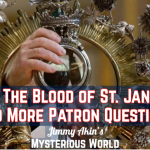
 Jimmy Akin's Mysterious World
Jimmy Akin's Mysterious World The Blood of Saint Januarius (And Other Patron Questions)
Sep 1, 2023
Topics covered in this episode include ultra terrestrials, role-playing games, lost languages, pole shifts, the authenticity of AA 1025, reasons for language extinction, the loss of ancient languages, and the identity of the beloved disciple in John's Gospel.
Chapters
Transcript
Episode notes
1 2 3 4 5 6 7 8
Introduction
00:00 • 2min
Ultra Terrestrials and Future Topics
01:33 • 5min
Opinion on the Dungeons and Dragons alignment system
06:41 • 5min
The Authenticity of AA 1025
11:52 • 25min
Reasons Languages Go Extinct and Historical Examples
36:50 • 5min
The Loss of Ancient Languages
42:16 • 17min
The Identity of the Beloved Disciple in John's Gospel
59:29 • 25min
Acknowledgments, engagement, and sponsor mentions
01:24:12 • 5min

 We regularly give Patrons the opportunity to ask Jimmy Akin and Dom Bettinelli their mysterious questions and make them available exclusively to Patrons first and then later to the whole audience. This time the questions cover the blood of St. Januarius, ultraterrestrials, Mary Suratt, RPGs, the Beloved Disciple, and more.
We regularly give Patrons the opportunity to ask Jimmy Akin and Dom Bettinelli their mysterious questions and make them available exclusively to Patrons first and then later to the whole audience. This time the questions cover the blood of St. Januarius, ultraterrestrials, Mary Suratt, RPGs, the Beloved Disciple, and more.